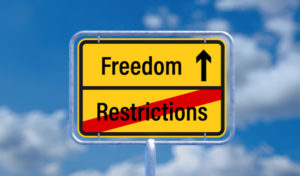European countries overall took a less restrictive approach to the emergence of the Omicron variant and the spike in cases it produced compared to previous COVID-19 scares. That less draconian approach and the businesses’ own experience with two years of punishing restrictions helped them overcome the wave with more ease than they had before. The Wall Street Journal reports:
As Omicron loomed over Europe in December, Graham Cook braced for yet another blow to his bowling business in London, fearing a fourth lockdown, potentially without government support, would force him to cut costs.
The new coronavirus variant triggered a wave of cancellations that wiped 20% off All Star Lanes’ revenue in the run-up to Christmas. But with only light restrictions in place, a New Year’s Eve party at one of the bowling venues was fully booked.
Despite record-high case numbers, the U.K. and other governments across Europe responded to Omicron with lighter restrictions than any previous wave of the virus, allowing businesses to remain open and Mr. Cook to break even.
“It was manageable,” said Mr. Cook, chief executive of All Star Lanes, which employs more than 200 people across its four venues in central London. “People did have the confidence to keep booking and largely they deferred to this year.”
The impact of Omicron in Europe has been more muted than previous Covid-19 waves, as governments responded to each successive surge of the virus with a lighter touch. Meanwhile individuals and businesses have, where possible, adapted to restrictions, minimizing the effects.
The result: Economic growth still slowed in Europe at the end of last year but far less than during earlier surges.
“Services are weakening but nowhere near to the extent that we’ve seen in previous waves,” said Claus Vistesen, chief eurozone economist at Pantheon Macroeconomics. “We’re probably already past it by now.”
If you’re willing to fight for Main Street America, click here to sign up for the Richardcyoung.com free weekly email.





